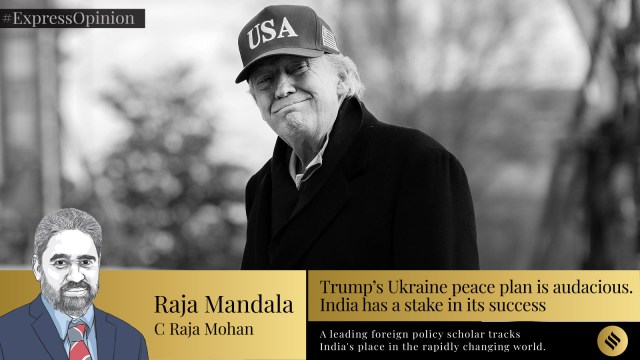
US President Donald Trump’s new peace plan for Ukraine offers a fresh look at what has long seemed an impossible proposition — a US-Russia partnership. Washington and Moscow have been at odds for nearly two decades, and many capitals have assumed the rivalry is permanent. Trump is challenging that assumption. He appears willing to take the relationship in a different direction.
His Ukraine peace plan contains ideas with sweeping implications — reintegrating Russia into the world economy, inviting Moscow back into the Western G7, and launching a broad US-Russia economic partnership. Trump’s 28-point peace formula for Ukraine mirrors key Russian demands — ceding eastern Ukraine and Crimea, keeping Kyiv out of NATO, and limiting its military.
Trump backed the proposals with an ultimatum to Kyiv — decide immediately or face a cutoff of all military aid. The initiative has rattled Europe, angered Ukraine, and generated strong criticism in the US. Washington and Kyiv held talks on Sunday to narrow differences, and both sides reported progress. But the issues remain complex — Ukraine’s territorial integrity, its sovereign right to self-defence, and the nature of security guarantees from the US and Europe.
Trump’s demand for a quick settlement comes amid war fatigue in Ukraine and the weakening domestic position of President Volodymyr Zelenskyy. Europe remains defiant, despite its difficulty in filling the vacuum created by Trump’s suspension of military assistance.
In the US, the pushback has been immediate and substantive. Russia has few friends in Washington other than the President. In his first term, Trump defied the bipartisan consensus on Russia and paid a political price — cast as a Kremlin puppet and even impeached. Yet, he has remained insistent through four years out of office and is now back in the White House.
While much of the foreign policy establishment views Trump’s peace plan as appeasement, parts of the MAGA movement argue that the US must withdraw from entangling conflicts in Europe, especially Ukraine. For Trump, the challenge is considerable: Overcoming institutional resistance in Washington, persuading Kyiv to accept constraints on its sovereignty, and convincing Europe to support a peace deal with Moscow. Even if he achieves all this, he faces a difficult negotiation with Putin — the more he bends toward Ukraine and Europe, the harder it may be to find common ground with Moscow.
The Kremlin believes time is on its side. It assumes Ukraine’s position will weaken the longer the war continues and anticipates deepening divisions within Europe and across the Atlantic.
Whether or not Trump succeeds, his out-of-the-box thinking raises larger questions about Eurasian geopolitics — and their implications for India. Critics call Trump’s outreach naïve, but the logic echoes an old Western idea: Preventing any single power, or coalition, from dominating Eurasia. Today, that means loosening Russia’s deepening embrace with China. The Ukraine war has only tightened that bond. Cut off from the West after Crimea in 2014 and fully ruptured after the 2022 invasion, Russia turned decisively toward Beijing — now its principal economic partner, energy customer, technology provider, and geopolitical backer.
Trump wants to reverse this trend. For him, reintegrating Russia into the global economy, deepening bilateral commercial and technological cooperation, and bringing it back to the geopolitical high table are tools to reduce Russia’s dependence on Beijing.
Is this strategy a credible one? Sceptics note Russia has little reason to trust the US, given the volatility of American policy. Even if Putin sees Trump as a favourable interlocutor, the Russian establishment doubts whether Washington can sustain over the long term any bargain with Moscow.
Optimists counter that even a limited entente with the US would significantly enhance Putin’s room for manoeuvre and reinforce Russia’s identity as an independent great power, not a junior partner to China. Despite battlefield gains, Russia faces severe economic challenges; a thaw with the West would be enormously helpful. A return to the G8 and Western acknowledgement of its security concerns would strengthen Moscow’s traditional claim for a role in stabilising Europe’s security architecture and shaping world politics.
For India, the potential shift is consequential. Delhi worries about a “G2” — a Sino-American condominium over Asia — but has far fewer concerns about an “E2”, or US-Russia cooperation in Europe. Any accommodation between Washington and Moscow would make it easier for Delhi to sustain its ties with both. India would like to see the conflict between Russia and the West end at the earliest.
Yet, Delhi has never subscribed to the view that Russia and America are permanent adversaries, nor to the belief that Moscow will always support India against the West. India remembers that the US and Soviet Union were military allies during World War II; that the Soviet Union sought a global duopoly with the US in the 1970s; and that post-Soviet Russia in the 1990s was so focused on integrating with the West that it had little time for India. Equally, Delhi cannot ignore the negative consequences of today’s Sino-Russian alliance for India’s security.
The key for India is to recognise that relations among the US, Russia, and China are in deep flux. Delhi must be open to the possibility of improving US-Russia ties and acknowledge that Moscow could emerge as the swing state in shaping Eurasian geopolitics. There is no reason for India to take sentimental or ideological positions on disputes among the great powers.
Delhi will also note the irony: Even as Trump seeks a rapprochement with Russia, his administration has imposed punitive tariffs on India for buying Russian oil. But such contradictions are inherent to the logic of geopolitics. India’s priority must be to avoid getting entangled in great-power jockeying. Enhancing India’s national power must remain the sole criterion guiding its great power diplomacy.
The writer is contributing editor on international affairs for The Indian Express and distinguished professor at the Motwani-Jadeja Institute of American Studies, Jindal Global University. He also holds the Korea Chair on Asian Geopolitics at the Council on Strategic and Defence Research